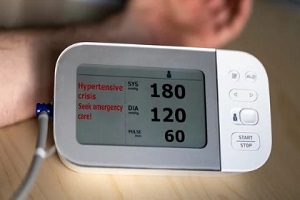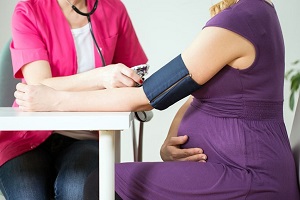 A hypertensive crisis, characterized by a sudden and extreme increase in blood pressure, is a critical condition that needs immediate attention. If overlooked, it can result in severe damage to your blood vessels and vital organs and in extreme cases, can be life-threatening.
A hypertensive crisis, characterized by a sudden and extreme increase in blood pressure, is a critical condition that needs immediate attention. If overlooked, it can result in severe damage to your blood vessels and vital organs and in extreme cases, can be life-threatening.
Understanding the symptoms, causes, and treatment options for a hypertensive crisis will prepare you to navigate this serious health issue more effectively.
Causes of Hypertensive Crisis
Several factors may precipitate a hypertensive crisis. These causes can be categorized under lifestyle factors, medical factors, and specific conditions linked to a sudden increase in blood pressure.
Lifestyle Factors
Certain lifestyle choices can increase your likelihood of developing hypertension and potentially lead to a hypertensive crisis:
- Overweight or Obesity: Excess weight strains your heart, making it work harder to pump blood throughout your body. This increased workload can elevate your blood pressure, increasing the chances of the onset of a hypertensive crisis.
- Unhealthy Diet: Diets high in salt can increase blood pressure. Eating too much sodium increases the amount of fluid your body retains, resulting in a spike in blood pressure.
- Physical Inactivity: Lack of regular physical activity leads to higher heart rates. The harder your heart works, the stronger the force on your arteries, which can increase blood pressure.
- Smoking: Tobacco products contain chemicals that can negatively impact your blood vessels, leading to narrower arteries and blood pressure spikes.
Medical Factors
Various medical conditions can contribute to the onset of a hypertensive crisis:
 Cardiovascular Disease: Pre-existing heart conditions can lead to hypertension, increasing the risk of a hypertensive crisis.
Cardiovascular Disease: Pre-existing heart conditions can lead to hypertension, increasing the risk of a hypertensive crisis.- Underlying Health Issues: Certain chronic health problems, such as diabetes and kidney disease, can negatively affect blood pressure.
Hypertensive Crisis-Specific Causes
Specific circumstances and actions can lead directly to a hypertensive crisis:
- Medication Non-Compliance: If you’re prescribed blood pressure medications, taking them as directed is crucial. Skipping doses or stopping the drug can lead to a sudden surge in blood pressure.
- Drug Interactions: Certain medications can interact with each other or with hypertension medications, causing an unexpected increase in blood pressure.
- Illegal Drugs: Certain recreational drugs, such as cocaine and amphetamines, can lead to a dramatic and dangerous spike in blood pressure.
- Life-Threatening Conditions: Certain severe conditions, such as a stroke, heart attack, or organ failure, can suddenly raise blood pressure, causing a hypertensive crisis.
Symptoms of Hypertensive Crisis
A hypertensive crisis often manifests itself through an array of symptoms. However, some people might not have any symptoms, making regular blood pressure checks vital. If you can monitor your blood pressure and find a reading of 180 mm Hg/120 mm Hg or higher, it’s advised that you wait a few minutes and recheck.
If the reading remains the same, you should contact your healthcare provider promptly. The symptoms of a hypertensive crisis can vary significantly but often include the following:
- Severe headache or migraine: It’s often described as the worst headache of your life and might be accompanied by blurry vision or changes in consciousness.
- Dizziness: A sudden onset of severe dizziness or vertigo can be a symptom.
- Confusion: An unexplained sudden state of confusion or altered mental status.
- Severe anxiety: A state of severe unease or fear for no apparent reason.
- Nausea or vomiting: An unexplained, severe nausea or vomiting.
- Chest pain: Pain or discomfort that can feel akin to heavy pressure or a squeezing sensation on your chest.
- Vision Changes: This could be blurry, double, or even no vision.
- Shortness of breath: Having trouble breathing or experiencing the feeling of being winded with minimal or no exertion.
- Nosebleed: Unexplained nosebleeds can occur, often in conjunction with other symptoms.
- Fits or seizures: In extreme cases, a hypertensive crisis can lead to attacks.
It’s crucial to note that any of these symptoms, alongside a high blood pressure reading, necessitate immediate medical attention.
Treatment for Hypertensive Crisis
The treatment for a hypertensive crisis aims primarily to reduce dangerously high blood pressure levels and manage any associated symptoms or complications. While treatment will differ based on your particular situation, and you should always speak to your healthcare provider to determine the best approach, it will often involve the following:
 Intravenous Antihypertensive Medications: Initially, doctors will use fast-acting, intravenous (IV) medications to rapidly reduce your blood pressure. The medications used can differ based on various factors, such as whether you’re pregnant, have any other underlying health conditions, or if drug use precipitated the crisis.
Intravenous Antihypertensive Medications: Initially, doctors will use fast-acting, intravenous (IV) medications to rapidly reduce your blood pressure. The medications used can differ based on various factors, such as whether you’re pregnant, have any other underlying health conditions, or if drug use precipitated the crisis.- Oral Antihypertensive Medications: Once your blood pressure is under control, your doctor will switch to oral medications. The intention is to ensure long-term control of your blood pressure levels.
- Monitoring and Management of Complications: The healthcare team will closely monitor you for any signs of organ damage throughout this process. If a hypertensive crisis is not treated promptly, it can lead to more serious conditions such as stroke, heart attack, pulmonary edema, aortic dissection, or kidney failure.
Take Control of Your Health and Blood Pressure with Imperial Center Family Medicine
Recognizing the symptoms of a hypertensive crisis is crucial as it could save your life. It’s just as vital to understand the causes and treatment options. However, preventing its onset through a healthy lifestyle, balanced diet, and medication compliance remains the best approach.
The Imperial Center Family Medicine team is committed to assisting you in maintaining healthy blood pressure levels and reducing the risk of a hypertensive crisis. With our expert guidance, managing your hypertension effectively becomes more achievable.
So, don’t wait until you’re in a hypertensive crisis. Instead, contact us today at 919-873-4437 or online, and let’s take a proactive approach to managing your condition.
